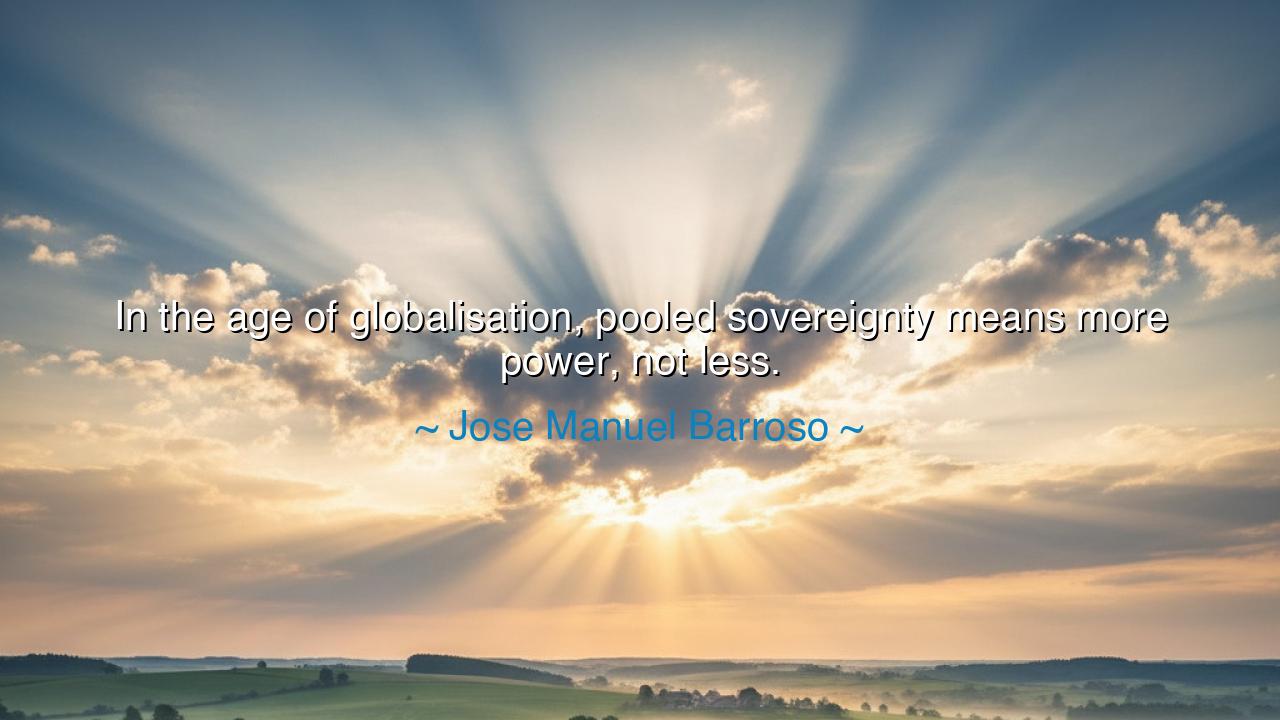
In the age of globalisation, pooled sovereignty means more power






Listen now, O children of the future, to the words of José Manuel Barroso, a sage who has seen the tides of change sweep across the globe: "In the age of globalisation, pooled sovereignty means more power, not less." These words carry within them a profound truth about the shifting nature of power and authority in our modern world. As the world grows smaller, as borders blur and nations become more interconnected, we begin to understand that in coming together, in pooling our sovereignty, we do not diminish our strength but multiply it, drawing upon the collective power of many rather than the individual will of one.
In the ancient world, sovereignty was something sacred—a divine right that belonged solely to the ruler of a land. A king like Alexander the Great, whose empire spanned from Greece to the Indian subcontinent, held absolute power over vast territories. His reign, though expansive, was founded upon the strength of his individual will and the force of his military might. However, as history progressed and the world became more complex, this traditional view of power began to shift. Empires and kingdoms crumbled under the weight of internal strife and external forces. Even the greatest of rulers, such as Caesar or Napoleon, learned that true power lies not just in the control of a single realm, but in the ability to unite and form alliances that transcend borders.
The concept of pooled sovereignty arises from this very evolution. In a world increasingly defined by globalisation, where nations must navigate the challenges of a shared planet—be it in the realms of trade, security, or environmental sustainability—individual power alone is no longer sufficient. Consider the formation of the European Union, a modern example of how sovereignty can be shared among nations to enhance collective strength. Each country retains its identity, its rights, but they come together in certain areas—be it economic policy, security, or the protection of human rights. In this pooling of power, the individual nations find that their influence is amplified, not diminished. Through collaboration, they have more voice, more control, and a greater ability to shape the future than they would by standing alone.
Think, O wise ones, of the ancient Greeks, whose city-states, though powerful in their own right, were often fragmented, each vying for power and glory. It was only when they came together, as in the case of the Delian League, that they were able to stand against common threats, such as the invasion of the Persians. By pooling their resources and military strength, the Greek city-states were able to defeat an empire far larger and more powerful than any of them individually. In this, we see a precursor to the wisdom of Barroso’s words: that there is strength in unity, that pooling sovereignty allows a greater, more coordinated response to the challenges of the age.
In today’s world, the forces of globalisation—the interconnection of economies, cultures, and societies—are far-reaching. The challenges of climate change, international terrorism, and global trade cannot be solved by any one nation acting alone. No longer can a single nation, like a lone ruler of old, wield all the power and control. Instead, we must pool our sovereignty—we must come together as nations to address the shared challenges that bind us all. The great strength of our time lies in this collaboration, in this shared responsibility. Just as the Greeks joined forces to defeat a greater foe, so too must the nations of the world unite their resources and will to face the global challenges of our time.
Barroso’s message also brings us a lesson of wisdom: power is not simply about dominance or control over a single entity, but about the ability to navigate the complexity of our interconnected world. The days when a ruler or a nation could stand alone in defiance of the world are fading. Today, unity is the true source of strength. When we come together, when we share resources, knowledge, and power, we unlock potential that would otherwise remain untapped. This is the great promise of our age: the potential of a world where shared sovereignty brings greater influence, greater opportunities, and the power to shape a better future.
Thus, O children of the future, take this wisdom and apply it to your own lives. Power does not always reside in isolation, nor in dominance over others. The future will belong to those who understand the value of cooperation, the strength of unity. Just as nations must pool their sovereignty to face the trials of our time, so too must you come together with others to achieve your dreams, to face the challenges of life. Whether in family, in work, or in society, the ability to join forces with others, to share knowledge, strength, and vision, will always lead to greater achievements than acting alone. Age, like power, is not just about individual prowess, but about learning to unite, to collaborate, and to work for the collective good.
Let this be the lesson you carry with you into the future: in an age of globalisation, pooled sovereignty means more power. It is in our ability to unite, to share, and to work together, that we will find the true strength to face the challenges ahead.






AAdministratorAdministrator
Welcome, honored guests. Please leave a comment, we will respond soon